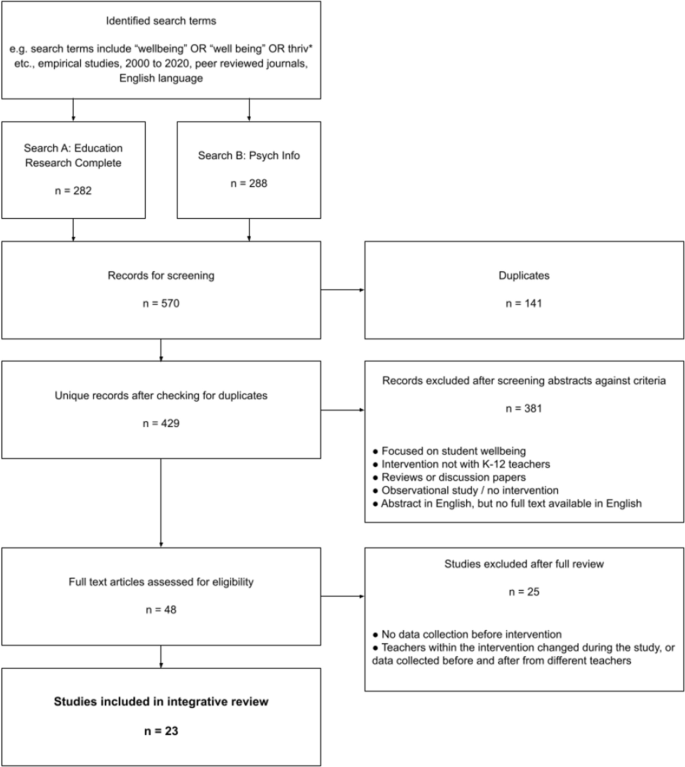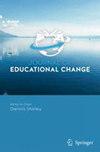What do we know about interventions to improve educator wellbeing? A systematic literature review
IF 2.5
2区 教育学
Q1 EDUCATION & EDUCATIONAL RESEARCH
引用次数: 1
Abstract
Abstract This systematic literature review summarises the research into interventions intended to improve the wellbeing of educators in the early childhood to secondary sectors. A search of articles published between 2000 and 2020 yielded 23 articles that met our inclusion criteria. Studies were included if they collected quantitative or qualitative data about educator wellbeing pre-intervention and post-intervention from the same group(s) of educators. We classified articles into five categories based on their content: multi-foci (several content areas included in a program), mindfulness, gratitude, professional development (classroom practice oriented), and physical environment. The articles revealed wide variations in: wellbeing theories underpinning interventions, the phenomena measured, and the effectiveness of the interventions. In some studies wellbeing was conceptualised as the absence of negative states (such as stress), in other studies to the presence of positive states (such as satisfaction), and in a few studies as the combination of both these approaches. Some of the gaps noted across the research include the lack of attention to the role of the school climate in determining the success of an intervention, and the lack of analysis to explore whether interventions work better for some individuals than others (for example, a lack of reporting of the characteristics of participants who drop out of the interventions). Overall, the multi-foci interventions show the most promise for improving educator wellbeing.

我们对改善教育工作者福祉的干预措施了解多少?系统的文献综述
摘要:本系统的文献综述总结了旨在改善幼儿至中学教育工作者福利的干预措施的研究。检索2000年至2020年间发表的文章,得到23篇符合我们的纳入标准的文章。如果研究从同一组教育工作者那里收集了干预前和干预后教育工作者幸福感的定量或定性数据,则将其纳入研究。我们根据文章的内容将其分为五类:多焦点(一个项目包含多个内容领域)、正念、感恩、专业发展(以课堂实践为导向)和物理环境。这些文章揭示了在以下方面的广泛差异:支持干预的幸福理论、测量的现象和干预的有效性。在一些研究中,幸福感被定义为没有负面状态(如压力),在其他研究中,幸福感被定义为存在积极状态(如满意度),在少数研究中,幸福感被定义为这两种方法的结合。研究中指出的一些差距包括缺乏对学校氛围在决定干预成功方面的作用的关注,以及缺乏分析来探索干预是否对某些人比其他人更有效(例如,缺乏对退出干预的参与者特征的报告)。总体而言,多焦点干预对改善教育工作者的福祉最有希望。
本文章由计算机程序翻译,如有差异,请以英文原文为准。
求助全文
约1分钟内获得全文
求助全文
来源期刊

Journal of Educational Change
EDUCATION & EDUCATIONAL RESEARCH-
CiteScore
5.80
自引率
7.10%
发文量
23
期刊介绍:
The Journal of Educational Change is an international, professionally refereed, state-of-the-art scholarly journal, reflecting the most important ideas and evidence of educational change. The journal brings together some of the most influential thinkers and writers as well as emerging scholars on educational change. It deals with issues like educational innovation, reform and restructuring, school improvement and effectiveness, culture-building, inspection, school-review, and change management. It examines why some people resist change and what their resistance means. It looks at how men and women, older teachers and younger teachers, students, parents and others experience change differently. It looks at the positive aspects of change but does not hesitate to raise uncomfortable questions about many aspects of educational change either. It looks critically and controversially at the social, economic, cultural and political forces that are driving educational change. The Journal of Educational Change welcomes and supports contributions from a range of disciplines, including history, psychology, political science, sociology, anthropology, philosophy and administrative and organizational theory, and from a broad spectrum of methodologies including quantitative and qualitative approaches, documentary study, action research and conceptual development. School leaders, system administrators, teacher leaders, consultants, facilitators, educational researchers, staff developers and change agents of all kinds will find this journal an indispensable resource for guiding them to both classic and cutting-edge understandings of educational change. No other journal provides such comprehensive coverage of the field of educational change.
 求助内容:
求助内容: 应助结果提醒方式:
应助结果提醒方式:


